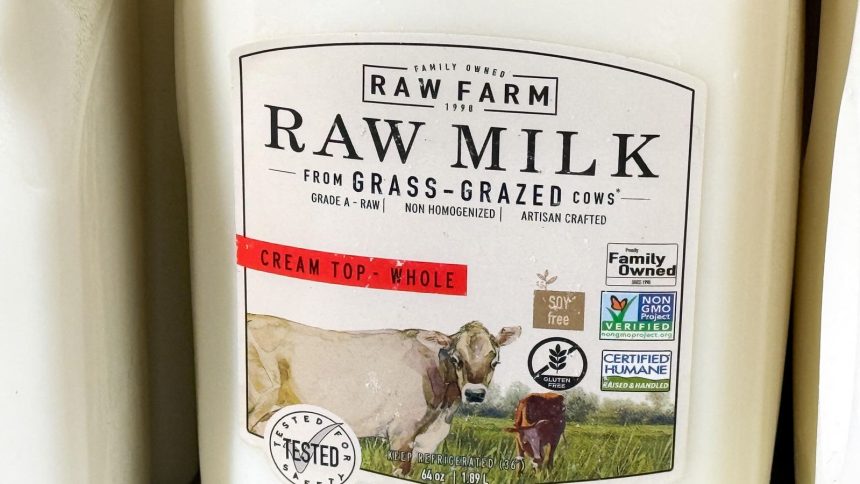The Los Angeles County Department of Public Health is investigating two suspected cases of avian influenza, commonly known as bird flu, in domestic cats. These cases are potentially linked to the consumption of raw, unpasteurized milk from a batch recalled last month due to H5N1 virus contamination. This incident marks another potential connection between unpasteurized dairy products and bird flu in California, raising concerns about the safety of raw milk consumption. The two cats, both kept indoors, exhibited symptoms including loss of appetite, fever, and neurological issues after consuming the recalled raw milk from Fresno-based Raw Farm. Their conditions deteriorated rapidly, ultimately leading to their deaths. Post-mortem testing revealed the presence of Influenza A, a broad category of viruses that encompasses common human seasonal flu strains as well as several avian influenza variants. While Influenza A infection in cats is uncommon, the detection raises significant questions about the potential spread of H5N1. Although there is currently no evidence of cat-to-human transmission of H5N1, individuals who had direct contact with the infected cats are under observation and have been offered antiviral medication as a precautionary measure. Authorities are emphasizing the various routes through which cats can contract the H5N1 virus, including consuming infected birds or animals, exposure to contaminated environments, and the ingestion of raw milk from infected cows. This incident underscores the risks associated with consuming raw milk, which can harbor harmful pathogens, including influenza viruses.
This incident follows another suspected case of avian influenza in a child in Marin County, California, also potentially linked to the consumption of raw milk. The child, who has since recovered, exhibited symptoms of fever and vomiting after drinking raw milk and tested positive for Influenza A. Further testing is underway to confirm the specific strain, including the possibility of H5N1. The child’s family members, who consumed smaller amounts of the same raw milk, have not reported any illness, suggesting a low likelihood of human-to-human transmission. Following the recall of the contaminated raw milk, California health officials have received reports of illnesses from ten individuals who consumed the product. These cases highlight the potential public health risks associated with unpasteurized dairy and underscore the importance of adhering to safety guidelines regarding raw milk consumption.
The potential for raw milk to serve as a vector for the H5N1 virus raises significant concerns about public health. While there are no confirmed cases of human bird flu directly linked to raw milk consumption, these recent incidents emphasize the need for further investigation and increased public awareness regarding the potential risks. Health authorities strongly advise against consuming unpasteurized milk due to the potential presence of various harmful pathogens. Pasteurization, a simple heating process that effectively eliminates harmful bacteria and viruses, is a crucial safety measure in milk production. The California Department of Public Health warns that raw milk consumption increases the risk of contracting foodborne illnesses from pathogens such as Salmonella, Listeria, E. coli, Brucella, and Campylobacter. The Centers for Disease Control and Prevention (CDC) also explicitly advises against consuming raw milk or products made from it, particularly in the context of the H5 bird flu virus.
Following the detection of H5N1 in samples of Raw Farm’s raw milk products collected from retail stores, the company issued a voluntary recall last month. The recall expanded to a complete suspension of all Raw Farm raw milk product sales after the virus was subsequently found in bottled products and bulk milk storage at the company’s bottling facility. These actions highlight the serious nature of the contamination and the potential for widespread exposure through the consumption of contaminated products. In response to the ongoing concerns regarding raw milk and its potential as a vector for pathogens, the USDA recently issued a new federal order. This order mandates the sharing of raw milk samples with the agency upon request and requires private laboratories and state veterinarians to report any positive test results for pathogens in raw milk to the USDA. This measure aims to strengthen surveillance and early detection of potential outbreaks associated with unpasteurized dairy products.
Despite repeated warnings from health officials and medical professionals about the dangers of consuming raw milk, its consumption is promoted by certain individuals, including some social media influencers and right-wing figures. Robert F. Kennedy Jr., President-elect Donald Trump’s nominee for Health and Human Services Secretary, is a prominent advocate of raw milk consumption. Kennedy claims to consume only unpasteurized milk and accuses the FDA of suppressing information about its benefits. This stance, counter to scientific consensus and public health recommendations, further complicates the issue and potentially contributes to the persistent consumption of raw milk despite known risks. The ongoing investigation into these suspected bird flu cases underscores the importance of public education and awareness regarding the risks associated with consuming unpasteurized dairy products.
The potential for H5N1 transmission through raw milk consumption highlights the importance of adhering to established food safety guidelines and the need for ongoing surveillance and investigation of potential outbreaks. While the risks associated with raw milk are well-documented, continued advocacy for its consumption by influential figures necessitates clear and consistent communication of the potential dangers by public health authorities. The recent USDA mandate for increased testing and reporting of raw milk samples is a positive step towards strengthening the monitoring of potential outbreaks and protecting public health. The incidents in Los Angeles and Marin counties serve as important reminders of the potential consequences of consuming unpasteurized dairy products and underscore the need for increased public awareness and adherence to food safety guidelines.



